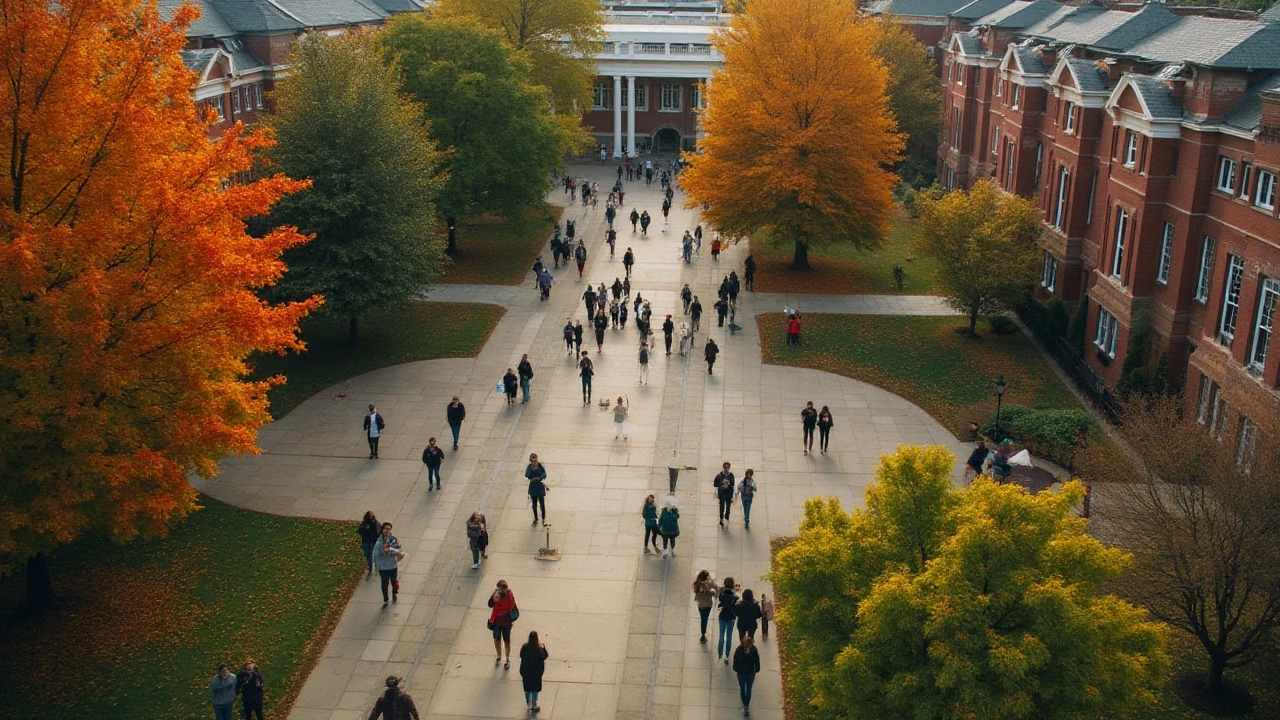Understanding Harvard's Average GPA: A Closer Look at the Ivy League Standard
 Jan, 5 2025
Jan, 5 2025
Harvard University, with its storied halls and illustrious alumni, stands as one of the pinnacles of academic achievement. For students around the world, understanding what it takes to get into and succeed at such an institution often begins with a straightforward question: What is the average GPA required to stand a chance?
While numbers and grades paint a picture of academic rigor, the larger story involves a tapestry of achievements, including vibrant after-school activities and personal initiatives that supplement academic pursuits. In the following paragraphs, we will explore not only the figures that define Harvard's grading scale but also dive into the stepping stones that can make or break an application.
- Harvard's Academic Reputation and Its Impact on GPA
- How Extracurricular Activities Complement Harvard's GPA Expectations
- Comparing Harvard's Average GPA to Other Ivy League Schools
- Tips for Aspiring Harvard Students to Achieve a Competitive GPA
Harvard's Academic Reputation and Its Impact on GPA
Harvard University's reputation as a beacon of education excellence is deeply intertwined with its demanding academic standards. This prestigious institution often sets the bar for what constitutes academic success, and its rigorous curriculum demands nothing less than the best from students. The average GPA at Harvard not only reflects the intellect of its student body but also mirrors the institution’s commitment to maintaining its global reputation. It's imperative to grasp that any prospective student or curious observer must understand the context behind these numbers. Despite the competitive nature of admissions, many applicants hedge their bets on high GPAs to gain entry, laboring for grades that frequently graze or soar above the average mark.
With a large offering of courses that span from arts and humanities to science and technology, Harvard ensures that students are pushed intellectually across all fields. Naturally, this high standard equates to an intense pressure to uphold academic excellence. Academic rigor and its consequences are no small feat. The average GPA at Harvard tips around 3.8 on a 4.0 scale, a testament to the university’s challenges. However, GPAs are not the sole determinants of success at Harvard. According to an analysis by The Harvard Crimson, students find that true triumph lies in balancing scholastic achievements with enriching extracurricular experiences and personal endeavors.
The competitive environment at Harvard fosters innovation and resilience. An illuminating realization among students is that while GPAs are significant, they are merely one facet of a multi-dimensional evaluation. Academic prowess is certainly rewarded, but creativity, leadership, and initiative receive recognition as well. This holistic approach to education underscores Harvard’s status as a premier institution. As Harvard alumnus and author William Deresiewicz once noted,
"It's not just about what you learn in the classroom, but about developing a critical and open mind behavior that Harvard encourages."Such insights resonate profoundly within the Ivy League ethos, where GPAs reflect not only rote memorization but the ability to think expansively and courageously.
The impact of Harvard's academic reputation ripples through its students’ prospects beyond university walls, creating doors of opportunity in various fields. Employers and academic institutions alike recognize the demanding environments that alumni have conquered, often seeking Harvard graduates due to their proven dedication and tenacity. Intrinsically, this echelon of excellence isn’t built overnight. Instead, it's nurtured through continuous challenges and learning, pushing students to meet or exceed the average GPA. Ultimately, the GPA is as much a measure of one's academic journey as it is a gateway to a future brimming with possibilities.

How Extracurricular Activities Complement Harvard's GPA Expectations
Harvard University's admissions process is famously holistic, meaning that beyond a solid academic performance, aspirants are also expected to distinguish themselves through extracurricular activities. These activities not only enrich the educational experience but also demonstrate a student's ability to excel in diverse areas, balancing rigorous academic demands while pursuing personal passions. Students who manage to maintain a competitive GPA alongside active involvement in clubs and societies showcase their readiness for the multifaceted challenges of Harvard life. Clubs and activities, especially those that require leadership or initiative, indicate to admissions that applicants possess the drive and resourcefulness required to thrive in Harvard’s dynamic environment.
Participation in after-school clubs such as debate, science, or cultural societies provides students with key experiences that are vital for Harvard's collaborative atmosphere. Engaging in these activities often helps students develop skills that are not necessarily nurtured in a classroom setting—such as team coordination, public speaking, and project management. Through managing their time effectively and taking on challenging roles, students learn resilience and adaptability, qualities that Harvard looks for in potential candidates. In a resource published by Harvard's Admissions Office, the emphasis is placed on the importance of pursuing passions genuinely, noting, "We seek to understand who you are as a person, not just a student."
Leadership and Initiative in Extracurricular Activities
One of the notable features of successful applicants is their demonstration of leadership in extracurricular endeavors. Students who take the initiative to lead projects or start new clubs often highlight their ability to inspire and manage a team. Harvard appreciates the creativity and entrepreneurship showcased by students pursuing innovative projects that benefit their communities. It underscores a student's potential to contribute positively to the Harvard community. In a survey conducted by Ivy League preparation consultants, nearly 75% of Harvard's admitted students reported significant leadership roles during their high school years. It is essential that students do not just participate but also seek ways to lead and innovate within their activities.External Competitions and Collaboration
Participation in external competitions or collaborative projects related to after-school clubs can also make a strong case for an application. These experiences often provide students with an opportunity to engage with peers from different backgrounds and schools, broadening their perspectives and social networks. Whether it’s a science fair, a music concert, or an academic conference, such activities are viewed favorably on applications. In these scenarios, students learn to navigate diverse ideas and approaches, an experience akin to the dynamic intellectual exchanges that are a hallmark of Harvard's academic environment.While a high GPA is undoubtedly an essential component of a Harvard application, it is the combination of these grades with varied and meaningful extracurricular activities that truly captures the essence of what Harvard seeks in its students. Harvard GPA statistics and profiles often show that the students who shine are those who have not just excelled academically but also made the most of opportunities to grow beyond the classroom. Thus, for those wishing to walk the illustrious halls of this Ivy League giant, embracing a proactive approach to extracurriculars can make all the difference.

Comparing Harvard's Average GPA to Other Ivy League Schools
When evaluating the academic prowess of the Ivy League, Harvard often stands as the archetype of excellence. Yet, in the realm of GPA, this reality takes on nuanced shades. A deep dive into the numbers reveals fascinating insights into how GPA metrics differ across these illustrious halls of learning. The average GPA at Harvard typically hovers around 3.65 to 3.7, suggesting a stringent grading policy and rigorous academic curriculum that maintains this elevated benchmark. As with any statistical measure, nuances abound, and these figures occasionally rise above deviations from department to department and year to year.
Interestingly, Harvard's GPA, while high, is not an outlier within the Ivy League. Yale often showcases a similar GPA metric, albeit with a minor degree of variance that renders exact comparisons complex. Princeton, once known for its grade deflation policies, has slowly recalibrated its stance, resulting in a comparable GPA landscape to other Ivy peers. Still, the small fluctuations between these institutions can give candidates a blueprint on where resources might be focused for optimal preparation.
As we widen our lens to include Columbia, Cornell, and Brown, the story remains consistent. Our understanding of these institutes is better nuanced not just by GPA but by the admission criteria and various facets like essays and extracurriculars, which weigh significantly in the assessment. A closer inspection might reveal that while the numerical threshold remains high, the symphony of other elements could often tip in or out of a candidate's favor. To elaborate further, here's a snapshot of average GPAs across Ivy League schools:
| Institution | Average GPA |
|---|---|
| Harvard University | 3.65 - 3.7 |
| Yale University | 3.6 - 3.8 |
| Princeton University | 3.5 - 3.7 |
| Columbia University | 3.5 - 3.75 |
Incredible as these numbers are, it's imperative to remember that GPAs alone don't chart the whole course. As James Morrison, a renowned educator in Ivy preparatory circles, once said,
"These institutions are looking for individuals who bring a consortium of talent—be it academic, artistic, athletic, or altruistic—meaning a plethora of pathways exist towards securing a coveted place."Such insights are illuminating for prospective students, underscoring the intricate dance between academics and extracurricular achievements that the Ivy League values.

Tips for Aspiring Harvard Students to Achieve a Competitive GPA
Securing a spot at Harvard University, with its stellar reputation for academic rigor, demands more than just intelligence. It requires strategic planning and disciplined execution of your study habits. The path begins with understanding what contributes to a competitive GPA. Many students often think the key is scoring straight A's, but there's more nuance involved. First, grasp the structure of your courses thoroughly, identifying which ones weigh more on your GPA and require extra attention. This strategic approach helps in balancing act between subjects.
Effective time management is another crucial ingredient for maintaining a strong academic record. Plan your calendar monthly, breaking larger goals into manageable weekly tasks. This routine ensures you’re not overwhelmed by examinations or assignments piling up towards the end of the semester. Regular check-ins with each syllabus can help anticipate upcoming pressure points. Utilize time-management tools available free online or as mobile apps, heralded by many students for increasing productivity, thus directly improving academic results.
To achieve an Ivy League level academic standard, participation doesn't end in the classroom. Engaging deeply with study groups or academic clubs related to your subjects can provide fresh perspectives and insights. Discussions in these groups frequently transcend textbook theory, sharpening students’ understanding and helping in practical applications of learned material. In line with this, Harvard places emphasis on holistic learning, which can be reflected in your intellectual curiosity and proactive pursuit of academic conversations.
As renowned academic advisor Paul Fields once said, “Grades are not just a measure of what a student knows – they're an indication of how they think. Never underestimate the power of a curious mind.”This quote resonates profoundly because curiosity drives learning. Stay hungry for knowledge beyond the curriculum, attending seminars, guest lectures, and talks by experts related to your fields may inspire topics for term papers or projects. Such intellectual engagement enhances your learning experience and could reflect positively in recommendations from professors.
The path to maintaining a competitive GPA at Harvard isn’t walked alone. Faculty, advisers, and peers provide vital support. Regular meetings with academic advisors can help recalibrate your focus and adjust strategies as necessary. These interactions may also pinpoint valuable resources on campus. Don't forget the Writing Center or Mathematics Assistance facilities, which could provide crucial help for core courses. Engaging with teaching assistants and professors during office hours can uncover misunderstandings before they affect your grades.
Use of Technology as a Learning Aid
Let technology be your ally in your academic journey. Various software and apps facilitate efficient learning, such as note-taking apps that sync across devices, or even language tools that can make comprehension smoother for complex subjects. These are not just for convenience, but essential tools aiding modern educational demands. Online platforms offering brief refresher courses or deep dives into specific topics are readily available and often free. By leveraging these digital resources, you can solidify your understanding, giving you the edge in achieving a truly competitive GPA.In essence, preparing for success at a university like Harvard is as dynamic as it is challenging. Through disciplined study practices, using academic standard resources, and maintaining active engagement within and outside scholarly environments, any dedicated student can nurture the seeds of academic excellence awaiting to flourish. Remember, the pursuit of knowledge is endless, and mastering these practices will not only prepare you for Harvard but for life's endless vistas of learning.
